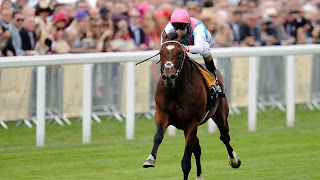Unlike too many other money arenas
these days – certainly unlike the Stockmarket trading floors, any
poker games or pool-halls – horse racing still affords one the
opportunity of being able to watch human psychology in a financial
crucible.
The biggest news in Australia and
anywhere 'horse racing-land,' right now is the seemingly quite
acrimonious split between one of the world's greatest horse trainers,
Gai Waterhouse, and one of the world's wealthiest advertising barons,
John Singleton.
 |
| The genuinely great trainer Gai Waterhouse |
I'm afraid not too many people will
know that Singleton's reach is certainly as far as New York and
Hollywood, since his public profile is largely limited to Sydney,
Australia. But then, not too many people would also know that Gai
Waterhouse was once an actress in London, who appeared next to Tom
Baker's Dr. Who, among a few successful productions.
Max Presenell, who in my view is also
one of the world's best racing journalists, gave a fairly detailed
description of what transpired at Sydney's Randwick racecourse last
Saturday, and it was such a sorry tale that I am embarrassed on
behalf of anything to do with Aussie horse racing to recount it
completely.
Max is too nice of a man to cast any
one side into deep darkness but I am driven more by what the human
psychology aspects are and so, I will certainly underscore
Singleton's stilted vision in the matter.
He is of course, at present complaining
either that his horse More Joyous was not allowed to run on its
merits, or, alternatively, that the mare shouldn't have raced that
day at all and that the trainer, Waterhourse wasn't being transparent
at all times about the situation due to a 'conflict of interest.'
I don't know anything about what really
happened, personally. Singleton is complaining that he punted
$300,000 and would have placed $600,000 on his horse but for a
rumour from 'good friends' advising him that Waterhouse's son Tom
Waterhouse, one of Randwick's leading bookmakers, had told friends
that the horse could not win.
Wags have already commented that Tom
Waterhouse doesn't have any friends. And that may be true!
However, the mare is a rising 7-year
old, who has already won almost 5 million dollars under the training
of Gai Waterhouse and no one that I know of who is experienced in
horse racing would have suggested this mare had any chance to win
this day at all no matter what else was going on.
John Singleton also says that the poor
public ought to have been told before the race that the horse was
experiencing some sort of issue which might have affected her running
up to her best.
I feel for John. He just blew $300,000
on a racing bet and clearly he needs his head examined for a lot of
things. I'm sure Disability Services Australia or some children's
hospital could have shown him a good time for half this kind of
money.
However, for all of us who are just as
focussed on the implications of understanding the value of mercantile
money that John clearly has shown, albeit with him in an excessively
exuberant way – let me set a certain matter on the table:
Investing too heavily in one side of an
expected financial outcome, always affects the risk/return ratio. And
therein lies the lesson which may be extrapolated to parts elsewhere.
And I will say just this, but I will make it perfectly clear in an
upcoming post – the gold market is under this same kind of mistaken
weight of dumb money right now.
 |
| Euro horse Frankel |
Calvin J. Bear




